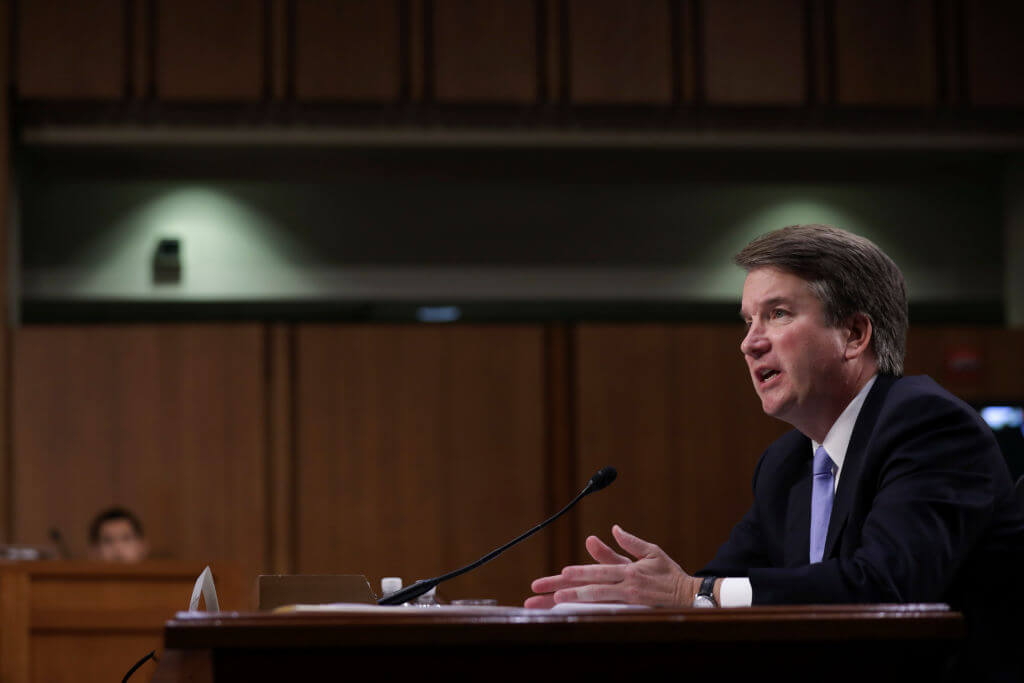It was Alison Krauss who most famously sang, “You say it best when you say nothing at all,” and never was the line more applicable than during the confirmation hearings for Supreme Court nominee Brett Kavanaugh.
Kavanaugh dodged and then flat out refused to answer questions on marriage equality and LGBTQ workplace discrimination protections Thursday, cementing fears that his confirmation could jeopardize decades of LGBTQ advances.
In a tense standoff with California Senator Kamala Harris, Kavanaugh punted on the question about whether he felt that the Obergefell v. Hodges case, which made marriage equality the law of the land in 2015, was correctly decided.
Kavanaugh dodged and then refused to respond to @KamalaHarris’s questions on his support for marriage equality and position on the ruling of Obergefell v. Hodges, which brought marriage equality nationwide. pic.twitter.com/ahmO51z3mX
— GLAAD (@glaad) September 7, 2018
“Senator, Justice Kennedy wrote the majority opinion in a series of five cases. Romer vs. Evans—” Kavanaugh started.
“If we can just talk about Obergefell, that’d be great” Harris replied.
“I want to explain it,” Kavanaugh said.
“I actually know the history leading up to Obergefell,” Harris cut in. ‘So can you just please address your comments to Obergefell?”
“I would like to explain it if I can,” he insisted, going on to list decisions impacting same-sex couples that came down from the Supreme Court.
Twice more Harris asked him about his personal opinion on the decision, until he finally admitted he wouldn’t answer.
“Each of the justices have declined, as a matter of judicial independence, each of them, to answer questions in that line of cases,” he said.
Kavanaugh further refused to say whether he thought businesses should be able to fire people for being gay.
New Jersey Senator Cory Booker repeatedly needled the nominee about his stance on anti-discrimination protections for LGBTQ people.
“Do they have a legal right to fire somebody just because they’re gay, in your opinion?” Booked asked.
Kavanaugh refused to respond to @SenBooker when asked if it should be legal to fire someone just because they are LGBTQ. pic.twitter.com/j4un4GP36y
— GLAAD (@glaad) September 7, 2018
“Senator, the question, as I’m sure you’re aware of the scope of employment discrimination law is being litigated right now, and therefore, um, I’d like to talk to you about this more,” Kavanaugh fumbled. “Because that issue is in a variety of cases right now, it would be inconsistent as I’m sure you’re going to understand.”
Booker pressed on, stating that people are worried he would overturn marriage equality and noting that in a majority of states, it was still legal to fire someone for being gay. Kavanaugh, again, conceded he would not answer.
“Senator, I’m a judge, and with the cases that you’re well aware of, pending in the courts about the scope of the civil rights laws, of course, Congress could always make those clear—”
Booker cut in: “That’s what I want to get to the point, that you won’t give me a moral answer.”
Advocates lambasted Kavanaugh’s non-answer as proof that his confirmation would imperil the basic rights of LGBTQ people.
“Judge Kavanaugh refuses to answer simple questions on the dignity of LGBTQ Americans and is unfit to serve on the Supreme Court,” said GLAAD President and CEO Sarah Kate Ellis in a statement. “With the world watching, Kavanaugh refused to tell LGBTQ Americans that we deserve equal protections under the law and Congress should take action before appointing him to a lifetime position where he will no doubt work to undermine our basic rights to liberty and justice.”
ICYMI: Last night, @SenBlumenthal entered our letter of opposition to Judge Kavanaugh's nomination into the record. Then @SenBooker, along with a number of others, took Kavanaugh to task on his unwillingness to say that employment discrimination against #LGBTQ people is illegal. pic.twitter.com/WB3NuAUsyH
— National Center for Transgender Equality (@TransEquality) September 7, 2018
Today we learned #Kavanaugh won't…
🚫 say that Roe is settled law
🚫 say #Obergefell is settled law. He'll chat about #Masterpiece though!
🚫 fire you for being Black, but, "can't say" if he would if you're gay
🚫 say it's wrong to politicize the judiciary#KavanaughHearings— Lambda Legal (@LambdaLegal) September 7, 2018
Kavanaugh’s associations with anti-LGBTQ figures and groups have already set off alarm bells. In late August, GLAAD urged senators to demand Kavanaugh spell out his stance on LGBTQ issues, noting his backing from extreme anti-LGBTQ organizations the Family Research Council and the Federalist Society.
Kavanaugh has also referred to anti-LGBTQ Justice Antonin Scalia as a “hero” and commended his dissent against Obergefell, which legalized same-sex marriage throughout the country.
Help make sure LGBTQ+ stories are being told...
We can't rely on mainstream media to tell our stories. That's why we don't lock our articles behind a paywall. Will you support our mission with a contribution today?
Cancel anytime · Proudly LGBTQ+ owned and operated
Read More in Impact
The Latest on INTO
Subscribe to get a twice-weekly dose of queer news, updates, and insights from the INTO team.
in Your Inbox
















